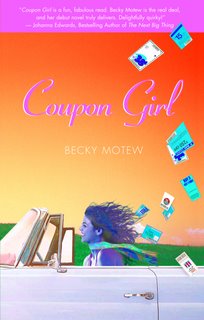
Today on Make-Believe Mondays I'd like to introduce Becky Motew.
Becky, first, tell us a little bit about the manuscript you’re working on now.
Becky: It’s about three women who shop at the same grocery store. Well, it’s about other things too, including lottery theft, treacherous boyfriends, and academic intrigue.
Very soon I plan to write a book called DALLIANCE WOMAN, about a woman who dates three married guys at the same time. It’s not me, I promise!!!
Debra: Well I should hope not!
Ray Bradbury said, “We are cups, constantly being filled. The trick is, knowing how to tip ourselves over and let the beautiful stuff out.” How do you keep your creative cup filled?
Becky: That’s a very good question. It’s a combination of what you let into your brain, including books, TV, regular life (whatever that means for you—for me it’s teaching, for someone else it’s log rolling), and what kind of program or schedule you have for letting all that out onto the page. If you only sit down to write once every six weeks, you’re going to be filled way up with creative ideas (probably), but some of them are buried underneath by then and you won’t remember them. The brain is a big saucepan and you provide the spoon, stirring up ideas.
Debra: Oh, I like that image, creativity being like a stew rich with flavors. And no soup or stew ever tastes the same unless you follow a recipe.
Is there a point when your characters begin to come alive and you can see and hear them?
Becky: Definitely. I think that happens for me when I write their dialogue. That’s when they seem most real. “HEY! IT’S ME!!! DON’T KILL ME OFF!!! PAY ATTENTION BECAUSE I’M A REAL PERSON!!!”
Some very famous authors have played with language, creating words for people or places that no one has ever heard of. Have you ever played with words in that way and if so how?
Becky: Mostly I think I stay in the realm of the real, so I don’t think I have created places that no one has ever heard of. The places I create are places we have all been. But I do adore names. I think names say everything, for instance Jane Austen’s gossipy character Fanny Assingham. Sometimes I go overboard on that, I know I do, but I can’t help it. Names are such an opportunity—they’re like titles in that regard. I named a character in COUPON GIRL, the big boss from the corporate headquarters, Lou Lambaster. It seemed right.
Debra: That's a great name! Dickens is another author who used great names. Tiny Tim and Scrooge. So fitting.
For some writers, dreams play a role in creating fiction. Has this been true for you? Have you ever dreamed a scene or an image that later wound up in one of your books?
Becky: No, but a couple of nightmare dates have.
Debra: You realize I'll be pestering you for those stories at the next RT convention.
As a child did any particular book or author pull you into their imaginary world?
Becky: Many many books pulled me in as a child. LITTLE WOMEN was one. The Enid Blyton mysteries were favorites. NANCY DREW of course and all the girl detective sagas. My father took me to the library every Friday night while my mother went to the grocery, so I had the leisure of working my way through the stacks. I’m sure my mother appreciated the peace and quiet. Little did she know I would eventually write a grocery store book, haha.
Debra: What a wonderful father daughter outing!
If there were no categories for books, no reader expectations to meet, and you could create the wildest work of imagination that you could think of what kind of story would that be?
Becky: I think I would still write in a realistic context. The wildest imaginary plots are sitting right beside us in church, or on the bus, or next door. You’ve heard the saying “truth is stranger than fiction”? It is.
Is there anything else you would like to add about the role of imagination, and dreams in creating fiction? Any other message for our readers?
Becky: What would life be like without imagination and dreams? They are two of the privileges we get as humans, aren’t they? They make life better because we can escape from the humdrum and see something new and different shining in the distance, even if it’s only Harvey the imaginary rabbit, and worse because we can’t sustain it or make it last or stay there as long as we would like. A writer doesn’t give up, though. A writer tries to capture this world and make it last, at least on paper. Don’t forget, I have no idea what I’m talking about.
Debra: Oh, but you know more than you think you know. We all do.
Thank you for joining us here on this Make-believe Monday to share a little bit of the magic of writing with our readers.
Becky: Thank you for having me, Debra.
Debra: You're quite welcome.
Visit Becky at www.beckymotew.com



